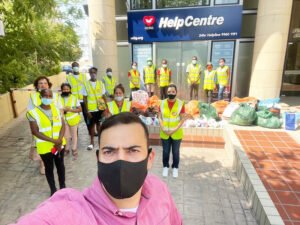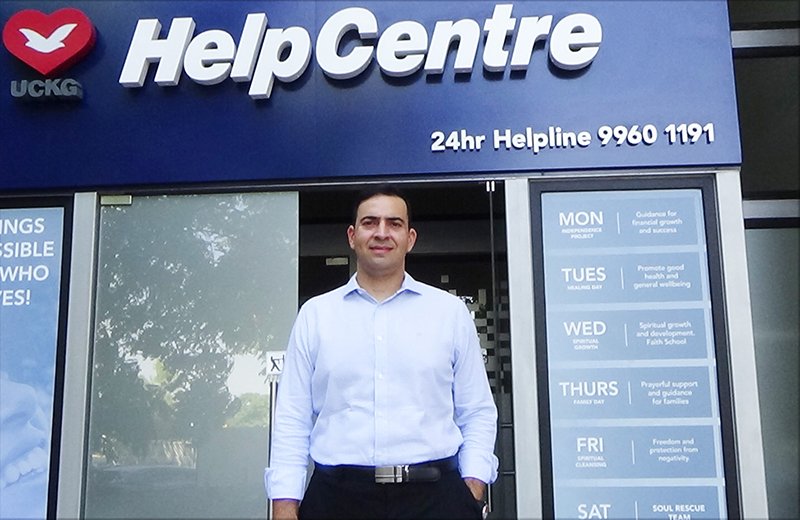THEO PANAYIDES meets an ordinary-looking couple in their 30s living their lives by 2,000-year-old precepts
It doesn’t even look like a church. One hundred metres from Eleftheria Square in Nicosia, next to Smoothie Factory (of all places), thick glass doors and a navy-blue sign emblazoned with the words ‘Help Centre’ and ‘24hr Helpline 9960 1191’. It looks vaguely corporate, like a customer service branch for some large organisation, a place you go to discuss payment options or complain about a recent purchase. It’s easy to ignore the heart-shaped logo perched atop the acronym UCKG – and, lurking discreetly in the bottom-left corner, ‘uckg.org’. UCKG is the Universal Church of the Kingdom of God.

So who speaks with them?
“Most of the time, I speak. I like to speak with everyone… I like to follow up with the person, to see how is everything. We make visits. We visit hospitals, we visit prisons”. He also visits Pournara – the detention centre for migrants – every Saturday, usually baptising about 20 people, most of them Christians who’d previously “abandoned the faith”.
Some might take issue at this point, wondering if a pastor with no qualifications in counselling or psychology should really be advising people on their problems – especially when the advice is based, explicitly, on “Biblical teaching”. Then again, qualifications aren’t everything. We’re joined by Fabricio’s wife Aldrea as we go upstairs to his office, one of the few fixtures in the small, functional room being a ‘Biblia Sagrada’ – the Holy Bible in Portuguese, a reminder that the couple are Brazilian. He’s from Patrocinio in the state of Minas Gerais (his full name is Fabricio Isaac Maciel Paula; the ‘Isaac’ comes from his paternal grandparents, who were Lebanese), she’s from Parana in the south. Both were born in small, unglamorous places, to troubled, dysfunctional families – creating a kind of instinctive empathy with the often-lost souls they meet here in Cyprus.
Aldrea’s father was a violent alcoholic who on one occasion tried to kill her mother. Later, after they divorced, the mother tried to kill herself, worn out by the effort of raising two kids with no support. (She joined the church soon after.) Fabricio’s family were perhaps a little better – at least there was love, he admits – but there were also “too many problems… We didn’t have stability in our house”.
His mum was a teacher; his father, he explains in slightly fractured English, “had many problems about drugs. He was addicted to drugs. He was also in jail”. Dad was never around, being either on the run or incarcerated; even now, though he’s finally clean, he walks with a cane (says his son), having been shot in the knee during his drug-dealing years. “At the age of 14, I also started in the same situation, using drugs,” recalls Fabricio. He smoked coca paste and marijuana, dodging gangs and running from the cops like a hunted animal. Two years later, when he was 16, his mother moved the whole family (sans Dad) to the US, specifically the suburbs of Atlanta; she hoped for a better life – but in fact nothing changed, except that the drugs were more plentiful and easier to access.
Fabricio dropped out of school and began to work: “I worked construction, I worked in restaurants, I worked in erosion control” (a fancy name for putting up fences). When he wasn’t working he partied and took drugs; most of the time he was stoned even at work. What was his plan for life? “I thought I was going to end up like my father,” he shrugs. “That was the plot I had in my head, I was going to be like him, drugs my whole life… You know how it is with someone addicted, they think there is no way out”. He wasn’t violent, though he got into fights (especially when he’d been drinking and no longer cared “if the girl had a boyfriend or not”) – he was just a hopeless, scrawny, skin-and-bones kid floundering through life. Then “you go home,” he recalls “and you don’t have friends, you don’t have no-one, so you are there, depressed, with anguish, empty, bad thoughts in your mind. So that’s where I started to see that I need help, you know?”.
One night he used too many drugs, had an overdose and nearly died. That was a wake-up call, but still he did nothing (like he says, feeling trapped is part of drug addiction); then came a second overdose – and this time “a friend of mine who was coming to [UCKG] in Atlanta invited me to come. He told me that I needed deliverance”. Fabricio came to the church; a pastor spoke with him, and prayed for him. “I started to have joy. And my life started to change, little by little… I heard the Word of God, and everything changed inside of me.”
This is not an unusual story; indeed, he affirms, one of the things he loves about UCKG is that many of its pastors have a similar story, “they came from suffering and overcame it”. A cynic might say it makes perfect sense for a church to seek disciples in the ranks of troubled young people; they make faithful servants – and are keen to pass on their experience to others – just because they’re so lost, and their lives so ripe for transfiguration. (“I needed direction,” says Fabricio, “this is the correct word. I didn’t have direction in my life.”) There’s a lot that cynics might say about the Universal Church of the Kingdom of God – which is not to denigrate the truth of the pastor’s own experience, or the value of the work he and Aldrea do here.

“For example, yesterday,” he says, reminded of something, and takes out his phone – “I’ll give you an example, yesterday this guy, he sent us a WhatsApp…” Fabricio rummages, then finds what he’s looking for: I read a message from a man – almost certainly a migrant – who says he’s sleeping on the street in Solomou Square, the central bus station; “Looking for any job to pay house rent”. Fabricio got a volunteer to call the man (there are 7-8 volunteers, known as ‘assistants’) and take him some food. “I told him to come today,” he reports with some excitement. “I’m going to speak with him.”
Sounds like a big responsibility, I note. After all, you might be his last hope.
“This is only one,” he shrugs, unfazed. “Yesterday I made three calls, similar situations. We do what we can, we help. Thank God we have many Cypriots who are helping us.”
There may well be Cypriots helping – but it sounds like the church is attracting precisely those people who aren’t being helped in Cyprus, those who fall through the cracks. “We save souls, you know? For example, I have an Ethiopian girl who comes to the church. She tried to kill herself three times over here. She drank chlorine, the other time she tried to jump…” He shakes his head glumly, unable to recollect what happened the third time. “She came [to Cyprus] to work, then she had problems, her boss didn’t pay, she was depressed… Today, she’s a volunteer. Today, she helps other people”.
The girl’s story is strikingly like his own – saved by the church at a low ebb in her life, then paying it forward. What can he do for these people, though? After all, he can’t solve their problems. “First of all, they need hope,” he replies. “They need to believe that there is a way out.” Again, it’s a lot like his own story: he didn’t need money, or work, as a young man – he needed hope, direction, a reason to believe in himself. They do offer practical help at the help centre (the Monday service, for instance, gives financial advice, ‘Guidance for financial growth and success’) – but above all they offer what he calls an “atmosphere”, a kind of holy bubble, which might also be another word for faith. “Jesus said – in the Book of Hebrews, if I’m not wrong – that ‘faith comes from the hearing of the Word of God’,” notes Fabricio, which is quite remarkable when you think about it. Just the fact of hearing the message makes it stronger; just the fact of being in the ‘atmosphere’.
The couple’s life, too, exists in a kind of holy bubble – most strikingly in the fact that they’ve made a conscious decision not to have children, “to give more time for the work of God”. The work consumes almost every waking hour. Fabricio has hobbies, to be sure (he loves fishing and football, and works out daily), and he’s also busy learning Greek twice a week, hoping to incorporate a service in Greek someday – but there’s very little social life beyond church and home, and of course none of the usual vices. (Though the Bible doesn’t say it’s a sin to drink alcohol, he clarifies; “What is sinful is to get drunk”.)
It’s easy to forget how extraordinary this ordinary-looking couple actually are, two people in their 30s living their lives by 2,000-year-old precepts. “I try to do what is right,” explains Aldrea, “and I obey what God says. For example, he is my – first boyfriend,” she smiles, turning to her husband, “and I married him 15 years ago. Why didn’t I suffer in my love life, let’s say? Because I choose to do right. I could do wrong.” ‘Help Centre’ sounds so secular, yet their faith has a strong mystical element. Aldrea says she was cured of childhood asthma by the power of prayer, and there’s also a volunteer from Uganda (we hear her talking outside at one point) who was plagued by stomach ulcers – but the church organised “an event”, says the pastor, and her pain disappeared.
What does he believe happens after death?
“I believe, according to the Bible, that either I go up or I go down,” he replies with a chuckle. “For eternity.”
Isn’t that a bit unfair, though? Take his father, for instance: he may well ‘go down’, with all the sins he’s committed – yet he’s not such a bad man, surely?
“But he had the opportunity…” sighs Fabricio unhappily. God grants free will, he explains; we make our choices. “Not unfair.”
He himself made his choices early and stuck to them fervently, devoting himself to serving the church that transformed his life when it mattered. Has his enthusiasm waned at all, after all these years? Has it become just a job for him? “No,” he says simply. “If it was ‘just a job’, I was going to have a family, I was going to have children, I was going to – you know, live more for me. But it’s a decision. I am like a missionary, if I can call it that. It’s like a mission, for us it’s like a mission. And I feel good doing it – because when you help someone, you feel good… My hope is to continue in this faith until I die,” says Fabricio Isaac – then escorts me downstairs through the help centre, pausing to scan the pews for the man who’s been sleeping rough in Solomou Square.







Click here to change your cookie preferences